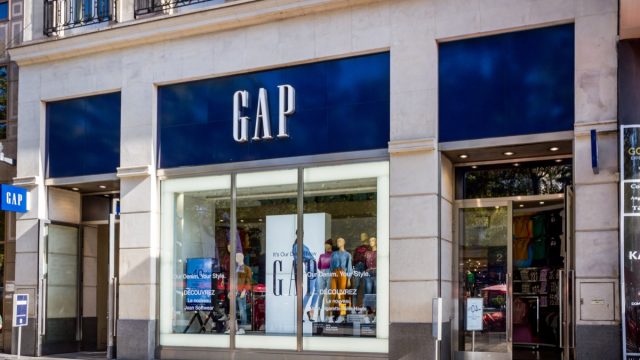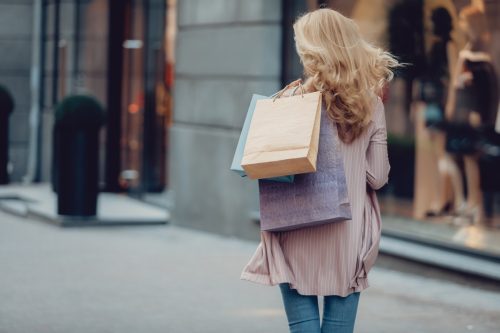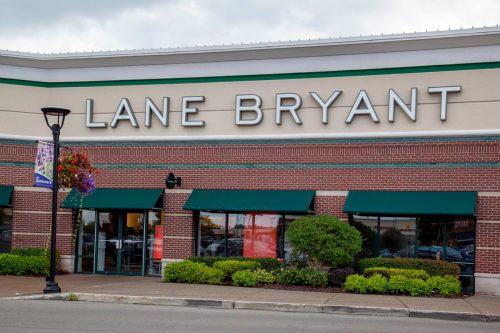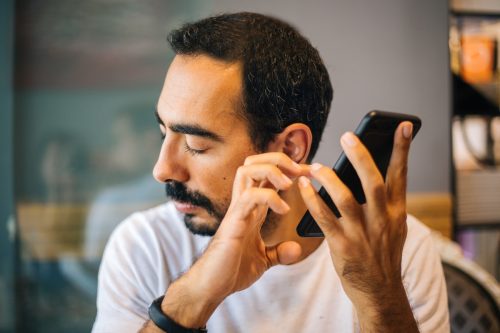Gap and Lane Bryant Are Under Fire for Not Doing This

Chances are you’ve found yourself in a Gap or a Lane Bryant store while shopping—maybe you’ve even made that a regular occurrence. These beloved clothing chains have been mall staples for decades, and now, both companies each have nearly 500 locations spread across the U.S. Even as Americans have largely moved away from shopping malls, Gap and Lane Bryant have managed to hold onto a loyal customer base and keep their stores afloat. Unfortunately, both retailers are now under fire for allegedly not providing fair access to all shoppers. Read on to learn about the lawsuit targeting Gap and Lane Bryant.
READ THIS NEXT: Hobby Lobby and Jo-Ann Fabrics Are Under Fire for Doing This to Shoppers.
The Americans with Disabilities Act has been in place for decades now.

Businesses have been prohibited from discriminating against individuals with disabilities for decades now under the Americans with Disabilities Act (ADA), which was signed into law by President George H.W. Bush in 1990. Under the ADA, the Department of Justice ensures protection for people with disabilities by providing public accommodation, and protects them from businesses limiting their ability to access goods and services for the public. According to the ADA National Network, there are approximately 56.7 million Americans—or roughly 18 percent of the population—with disabilities.
“In addition, persons with disabilities have friends and family members who care about disability and accessibility and are potential customers,” the ADA National Network explains. “Persons with disabilities have significant money to spend (more than $200 billion in discretionary income) and so do their companions and friends. An accessible business is safer and more user-friendly for everyone, including older customers and aging baby boomers.”
A consumer is now suing Gap and Lane Bryant over the law.

Gap and Lane Bryant are now both being sued by a consumer who claims the two companies have violated the ADA, Top Class Actions reported on Aug. 18. According to the news outlet, plaintiff Bryan Velazquez recently filed separate lawsuits against the Gap, Inc., and Lane Bryant Brands Opco, LLC, in the U.S. District Court for the Southern District of New York.
In the lawsuits, Velazquez, who is legally blind, claims that the two retailers are violating the ADA by allegedly not having websites that are “equally accessible to blind and visually impaired consumers.”
RELATED: For more up-to-date information, sign up for our daily newsletter.
The retailers’ websites are reportedly incompatible with software used by visually impaired people.

According to Velazquez’s suits, both Gap and Lane Bryant’s websites are not compatible with screen-reading software that he and other visually impaired individuals need to use to access the internet. The two sites allegedly have access barriers in place that make them incompatible, such as “broken links, duplicate title elements, missing label elements and title attributes, and a lack of alt text for graphical imagery.”
“Screen-reading software is currently the only method a blind or visually impaired person may use to independently access the internet,” Velazquez stated in the Gap and Lane Bryant class action suits, per Top Class Actions.
The lawsuit alleges that Gap and Lane Bryant are denying some consumers equal access as a result.

With the reported problems in place, the lawsuits say that Gap and Lane Bryant are not in compliance with the ADA and New York City human rights law. “These access barriers effectively denied Plaintiff the ability to use and enjoy Defendant’s website the same way sighted individuals do,” the lawsuits state, per Top Class Actions.
Velazquez is requesting a jury trial for both complaints, as well as relief and reward for damages against himself and other class members being discriminated against. “Defendant’s denial of full and equal access to its website, and therefore denial of its goods and services offered thereby, is a violation of Plaintiff’s rights under the (ADA),” the two suits state.
Best Life reached out to Gap and Lane Bryant for comment on the class action suits, but has not yet heard back.